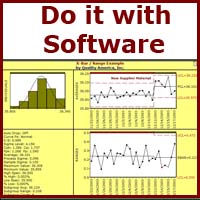Tools
Concepts
Deming Profound Knowledge & Systems Thinking
Deming on Management of People
Applications
Difference between TQM and Six Sigma
Importance of SPC to Quality Management System Performance
New Research Casts Doubt on Strategic Planning
By Thomas Pyzdek
December 1998
Strategy expert Gary Hamel, chairman of Strategos and a visiting professor at the London Business School has some advice for traditional strategic planners: "The best you can hope for is honorable mention in a Dilbert cartoon."
Strategic planning made its appearance on the business scene in 1965. The results since then have been disappointing. An extensive meta-analysis of empirical studies covering nearly 2,500 organizations concluded that "the overall effect of planning on performance is very weak" (Boyd 1991). Mintzberg summarizes over twenty years of strategic planning practice and research by stating "At the very least, we have found that planning is not “the one best way,” that it certainly does not pay in general, and that at best, it may have some suitability in particular contexts, such as larger organizations, those in mass production, etc." (Mintzberg 1994, 97).
In short, the evidence on strategic planning leads to the conclusion that it often does not work. Ultimately, the term "strategic planning" has proved to be an oxymoron.
Why Planning Fails
The Fatal Conceit
Modern management operates according to The Plan. The Plan is, of course, created by human beings. Most planning models place the responsibility for planning squarely on the shoulders of the CEO. The CEO, in turn, consults with any number of experts to get advice on how to proceed.
Nobel laureate economist F.A. Hayek, considered the problems which appeared in planned economies and concluded that we expect too much of our planners. We are asking them, in effect, to "order the unknown" for us. It is foolish of us to expect that any person or group of persons could ever do such a thing. And those presumptuous enough to believe that they can successfully carry out such an assignment are suffering from, according to Hayek, "The Fatal Conceit."
In a market economy knowledge is dispersed among millions of people, each acting interdependently. It is impossible for a single individual to know what all of these other people are doing, let alone know what they are planning to do. Yet, this information is vital if an accurate forecast is to be made, and an accurate forecast is the prerequisite for a valid plan. In a planned economy, whether the economy of a nation or a firm, the planner assumes that he can obtain this information through diligent research. In a free market the information about current conditions is automatically made available to everyone. Consider the following question: Is there a gasoline shortage in your town? You can answer this question with but a moments thought. You simply recall the prices displayed at the gasoline stations you passed by recently. If prices were surprisingly high, then yes, there is probably a gasoline shortage. The degree of the shortage is reflected in the relative price increase. Otherwise, there is probably not a gasoline shortage in your town. Furthermore, the price mechanism provides a built-in correction capability. If prices are high, producers will supply more gasoline to take advantage of the higher prices. Soon, prices will return to their normal levels.
Now consider the same question in a planned economy, one where you have the unenviable task of being the planner in charge of gasoline. You are in a huge building that also houses the planners in charge of butter, eggs, soap, toilet paper, and all other commodities and pleasantries for the people whose economic wants and needs are to be provided for by the planning authority. Now, we will assume that you are an honest and conscientious planner and that you want to do a good job. Your question for today is: is there a gas shortage in Happyville?
There are no prices in your planned economy. You must therefore use some surrogate for price. What will it be? You could ask the people in Happyville if there is a shortage, but they will probably say Yes, since it has always better to have more gasoline than not enough. You could drive around Happyville and count the number of cars waiting in gasoline lines, but if the shortage were severe enough or long enough people would probably abandon their cars. Or people might be anticipating a shortage and top off their tanks as a just-in-case measure. So short lines would not necessarily mean a thing. On the other hand, maybe nearly everyone is avoiding driving to save fuel.
What if, somehow, you determine that there is a real gasoline shortage in Happyville? What do you do about it? If there are other shortages, which one gets priority? Even if there are no shortages, redirecting trucks, trains and other resources to gasoline production and transportation might create shortages somewhere else.
As impossible as the job of a planner in a centrally planned economy is, consider how much more difficult the job of the planner is in a free market firm. True, she has the guidance of prices to help her, but now she must contend with a complexity that is made infinitely more vast by the presence of other firms. Some of these firms are direct competitors who will take action to counter the effectiveness of her plans. Others are not directly competing for her market, but they still compete for the same limited quantity of resources. Prices may go up, or they may go down. A new technology may make your products, services, and plans obsolete. The tastes of your customers may suddenly change due to an unexpected cause like a hit movie, a fad, or some world event.
Can anyone truly anticipate what will happen in such chaos? Obviously, the answer has to be no. Yet such omniscience is precisely what we expect from our planners. Consider the following comments taken from the Malcolm Baldrige criteria:
"Planning needs to anticipate many changes, such as customer expectations, new business opportunities, technological developments, new customer and market segments, evolving regulatory requirements, community/societal expectations, and thrusts by competitors. Plans, strategies, and resource allocations need to reflect these commitments and changes."
Solutions
According to Hamel, the dirty little secret of the strategy industry is that great strategies (or lousy ones) are recognized only after the fact. There is, in fact, no theory of strategy innovation. No formula to guide the strategist unscathed through the uncharted territory of the future. Instead of planning, says Hamel, firms must strategize. Strategizing seeks to create preconditions that give rise to strategy innovation rather than seeking to create a strategy per se. It involves a search for deep rules of strategy emergence. These rules, properly constructed, will position the organization on the edge of chaos. A region where there is neither too much order nor too much disorder. This does not mean a set of detailed procedures, like those required by ISO 9000. According to Hayek, these rules must be general, not specific. The job of the organizer is to cultivate an environment where a spontaneous order can emerge and flourish, not to create a particular order.
A delicate balancing act, to be sure. But the edge of chaos is a region where strategy will emerge as the system adapts itself to changes in the marketplace. It is where free market economies exist. Neither the complete disorder of anarchy, nor the complete control of Stalinism. Firms that operate in this region will put out many "feelers" and follow those that yield the best results. Firms like Microsoft, which appear to be running off in many directions, often contradictory directions, simultaneously. Microsoft peddles three different, and competing, Internet video technologies: video compression to compete with television, cable, and telephone. One cannot be sure which technology will become the wave of the future. It is best to play it safe and dabble in all of them. Strategies emerge as adaptations occur, rather than as the result of anticipating the future.
References
B.K. Boyd, "Strategic planning and financial performance: A meta-analytical review," Journal of Management Studies, XXVII, 4, 1991, 353-374.
Malcolm Baldrige National Quality Award application, 1998, page 41.
H. Mintzberg, The Rise and Fall of Strategic Planning, New York: The Free Press, 1994.
Gary Hamel, "Strategy Innovation and the Quest for Value," Sloan Management Review, Winter 1998.
F.A. Hayek, The Fatal Conceit: The Errors of Socialism (Chicago, IL: The University of Chicago Press, 1991)
Julie Pitta, "Putting out feelers," Forbes, May 18, 1998.
Learn more about the Quality Management tools for process excellence in The Handbook for Quality Management (2013, McGraw-Hill) by Paul Keller and Thomas Pyzdek or their online Quality Management Study Guide.





